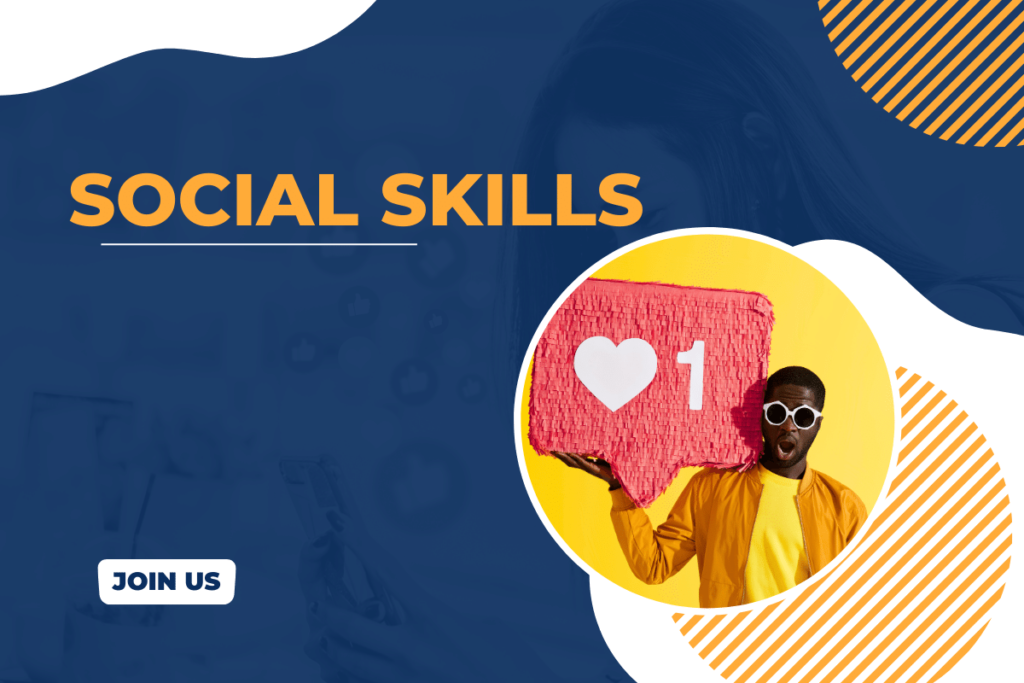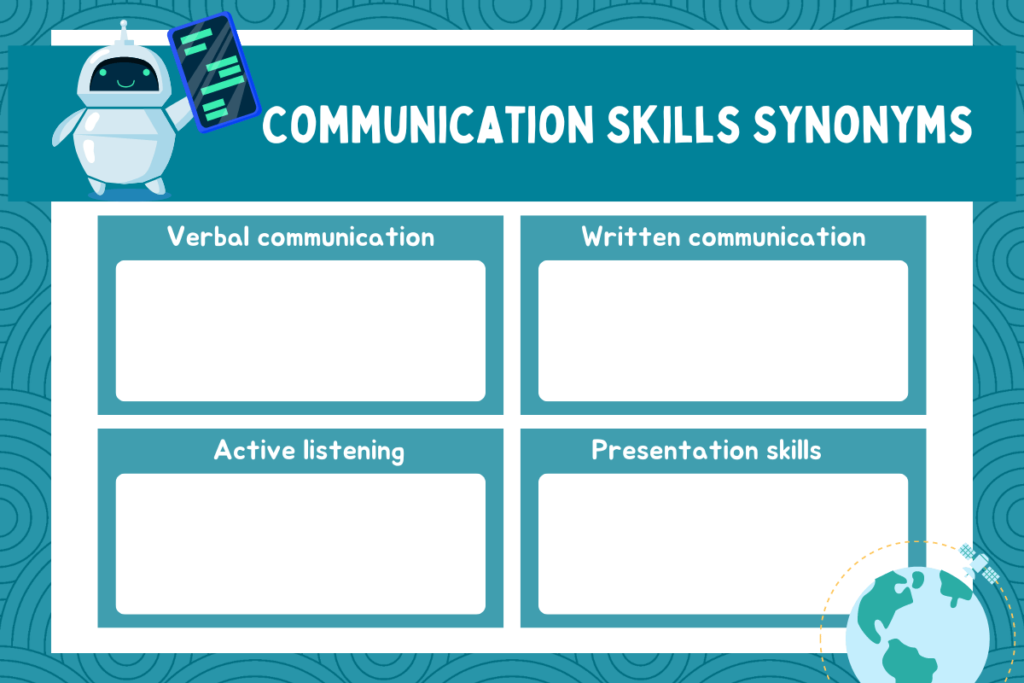Skills Synonyms Enhancing Your Resume and Communication

Introduction
In today’s competitive job market, effectively showcasing your skills and abilities is crucial. By using appropriate synonyms for skills, you cannot only enhance your resume but also improve your communication. This article delves into a variety of synonyms for common skills, with a special focus on people, communication, social, interpersonal, life, and soft skills, and highlights the benefits of incorporating these synonyms into your professional communication.
Read More Blogs:
Harmonizing Safety: Unraveling the Enigma of Network Rail Coss Questions And Answers
Digital Marketing: Navigating the Virtual Landscape
How Can 3D Game Development Revolutionize Your Gaming Experience?
People Skills Synonyms

Interpersonal skills
Interpersonal skills are the abilities that enable us to interact and communicate effectively with others. They involve our ability to understand and manage our own emotions, as well as the feelings of others. Interpersonal skills are essential for success in all aspects of our lives, from personal relationships to professional careers.
Here are some examples of interpersonal skills:
- Communication skills: The ability to express ourselves clearly and effectively verbally and nonverbally.
- Active listening is listening attentively to others and understanding their perspectives.
- Empathy: The ability to understand and share the feelings of others.
- Emotional intelligence: The ability to manage our own emotions and the emotions of others.
- Conflict resolution: The ability to resolve conflicts peacefully and productively.
- Teamwork: The ability to work effectively with others towards a common goal.
- Collaboration: The ability to work together to achieve a shared outcome.
- Leadership: The ability to inspire and motivate others to achieve a common goal.
- Negotiation: The ability to reach agreements with others that are mutually beneficial.
- Persuasion: The ability to convince others to see our point of view.
Interpersonal skills can be learned and developed through practice. There are many things we can do to improve our interpersonal skills, such as:
- Taking courses or workshops on interpersonal skills.
- Reading books and articles on interpersonal skills.
- Practicing active listening and empathy in our daily interactions.
- Volunteering or participating in group activities.
- Getting feedback from others on our interpersonal skills.
Developing strong interpersonal skills can lead to several benefits, including:
- Improved communication and relationships.
- Increased productivity and teamwork.
- Reduced conflict and stress.
- Greater success in our personal and professional lives.
If you want to improve your interpersonal skills, many resources are available to help you. With practice and dedication, you can develop the skills you need to succeed in all aspects of your life.
Social skills

Social skills are the abilities we use to interact and communicate positively and effectively with others. They involve our ability to understand and manage our own emotions, as well as the feelings of others. Social skills are essential for success in all aspects of our lives, from personal relationships to professional careers.
Here are some examples of social skills:
- Communication skills: The ability to express ourselves clearly and effectively verbally and nonverbally.
- Active listening is listening attentively to others and understanding their perspectives.
- Empathy: The ability to understand and share the feelings of others.
- Emotional intelligence: The ability to manage our own emotions and the emotions of others.
- Conflict resolution: The ability to resolve conflicts peacefully and productively.
- Teamwork: The ability to work effectively with others towards a common goal.
- Collaboration: The ability to work together to achieve a shared outcome.
- Leadership: The ability to inspire and motivate others to achieve a common goal.
- Negotiation: The ability to reach agreements with others that are mutually beneficial.
- Persuasion: The ability to convince others to see our point of view.
Social skills can be learned and developed through practice. There are many things we can do to improve our social skills, such as:
- Taking courses or workshops on social skills.
- Reading books and articles on social skills.
- Practicing active listening and empathy in our daily interactions.
- Volunteering or participating in group activities.
- Getting feedback from others on our social skills.
Developing strong social skills can lead to several benefits, including:
- Improved communication and relationships.
- Increased productivity and teamwork.
- Reduced conflict and stress.
- Greater success in our personal and professional lives.
If you want to improve your social skills, many resources are available to help you. With practice and dedication, you can develop the skills you need to succeed in all aspects of your life.
Here are some tips for improving your social skills:
- Be yourself. People can tell when you’re fake, so be genuine and authentic.
- Be interested in others. Ask questions and show that you’re interested in what they say.
- Be a good listener. Listen to what others are saying, both verbally and nonverbally.
- Be empathetic. Try to understand how others feel and see the world from their perspective.
- Be respectful. Treat others the way you want to be treated.
- Be positive. A positive attitude can make a big difference in how others perceive you.
- Be confident. Believe in yourself and your abilities.
- Be willing to learn and grow. Social skills are always evolving, so be open to learning new things.
By following these tips, you can improve your social skills and build stronger relationships with others.
Communication Skills Synonyms

Verbal communication uses spoken words to convey information, ideas, and emotions. It is essential for effective communication in all aspects of life, from personal relationships to professional settings.
Written communication uses written words to convey information, ideas, and emotions. It is an important skill for professional communication, as it allows us to communicate with others who may not be present in person.
Active listening is listening to others attentively and understanding their perspectives. It is an important skill for effective communication, allowing us to build rapport and trust with others.
Public speaking is speaking in front of an audience clearly and engagingly. It is an important skill for leaders and professionals who must communicate their ideas to large groups.
Presentation skills are the abilities needed to deliver a successful presentation, including planning, preparation, and delivery. Presentation skills are important for professionals who need to communicate their ideas to others clearly and persuasively.
Storytelling is the ability to tell stories in a way that engages and captivates the audience. Storytelling is an important skill for communicators who want to connect with their audience on an emotional level.
Persuasion is the ability to convince others to see your point of view or take a desired action. Persuasion is an important skill for leaders, salespeople, and anyone who wants to influence others.
These seven communication skills are essential for effective communication in all aspects of life. By developing these skills, you can improve your ability to connect with others, build relationships, and achieve your goals.
Here are some tips for improving your communication skills:
Verbal communication: Practice speaking clearly and confidently. Be mindful of your tone of voice and body language.
Written communication: Write clearly and concisely. Proofread your work carefully before sending it.
Active listening: Pay attention to what others say verbally and nonverbally. Ask clarifying questions to show that you are engaged in the conversation.
Public speaking: Practice your speech in advance and be prepared to answer questions from the audience. Use visual aids to help you engage your audience.
Presentation skills:
- Plan and prepare your presentation carefully.
- Use slides or other visual aids to support your points.
- Practice your delivery so that you can speak confidently and smoothly.
Storytelling: Choose stories that are relevant to your audience and will resonate with them emotionally. Practice telling your stories so that they are engaging and memorable.
Persuasion:
- Be clear about your goals and the desired outcome.
- Use evidence and data to support your arguments.
- Be respectful of others’ opinions, even if you don’t agree with them.
By following these tips, you can improve your communication skills and become a more effective communicator in all aspects of your life.
Social Skills Synonyms
Empathy is the ability to understand and share the feelings of another person. It is an important skill for building relationships and resolving conflict.
Emotional intelligence is the ability to understand and manage your own emotions, as well as the feelings of others. It is an important skill for success in all aspects of life, from personal relationships to professional careers.
Cultural competence is understanding and interacting effectively with people from different cultures. It is an important skill for anyone who works with people from diverse backgrounds.
Relationship building is the ability to build and maintain strong relationships with others. It is an important skill for personal and professional success.
Networking is the ability to build and maintain a network of professional contacts. It is an important skill for career advancement and job searching.
Conflict resolution is the ability to resolve conflict peacefully and productively. It is an important skill for anyone who works with others.
Social awareness is the awareness of different situations’ social cues and norms. It is an important skill for anyone who wants to be successful in social interactions.
These seven social skills are essential for success in all aspects of life. By developing these skills, you can improve your ability to connect with others, build relationships, and achieve your goals.
Here are some tips for improving your social skills:
- Empathy: Practice putting yourself in other people’s shoes and trying to understand their perspectives.
- Emotional intelligence: Pay attention to your own emotions and the emotions of others. Learn how to manage your feelings and respond to others positively and productively.
- Cultural competence: Learn about different cultures and how to interact with people from various backgrounds.
- Relationship building: Make an effort to build relationships with others. Be genuine and authentic, and show interest in others.
- Networking: Attend networking events and meet new people. Be open to connecting with people from different backgrounds and industries.
- Conflict resolution: Learn how to resolve conflict peacefully and productively. Be willing to compromise and find solutions that work for everyone involved.
- Social awareness: Pay attention to different situations’ social cues and norms. Be respectful of others and adapt your behavior to fit the situation.
- By following these tips, you can improve your social skills and become a more successful communicator in all aspects of your life.
Interpersonal Skills Synonyms
People Skills
People skills are the abilities that enable us to interact and communicate effectively with others. They involve our ability to understand and manage our own emotions, as well as the feelings of others. People skills are essential for success in all aspects of our lives, from personal relationships to professional careers.
Synonyms
- Interpersonal skills,
- Social skills,
- Communication skills,
- Emotional intelligence,
- Empathy,
- Active listening,
- Conflict resolution,
- Teamwork,
- Collaboration,
Importance
People skills are important because they allow us to:
- Build and maintain strong relationships
- Communicate our ideas and thoughts clearly
- Resolve conflict peacefully and productively
- Work effectively in teams
- Collaborate with others to achieve common goals
- Understand and manage our own emotions, as well as the feelings of others
- Adapt our behavior to different social situations
- Build trust and rapport with others
Development
People skills can be learned and developed through practice. There are many things we can do to improve our people skills, such as:
- Taking courses or workshops on interpersonal skills
- Reading books and articles on interpersonal skills
- Practicing active listening and empathy in our daily interactions
- Volunteering or participating in group activities
- Getting feedback from others on our interpersonal skills
Benefits
Developing strong people skills can lead to several benefits, including:
- Improved communication and relationships
- Increased productivity and teamwork
- Reduced conflict and stress
- Greater success in our personal and professional lives
People skills are essential for success in all aspects of our lives. Developing these skills can improve our ability to connect with others, build relationships, and achieve our goals.
Life Skills Synonyms
Definition: Life skills are the abilities we need to manage our daily lives and make informed decisions. They include many skills, from problem-solving and critical thinking to time management and financial literacy.
Importance: Life skills are important because they allow us to:
- Live independently and take care of ourselves
- Manage our finances and make informed decisions about our spending
- Maintain our health and well-being
- Build and maintain relationships
- Cope with stress and difficult situations
- Adapt to change and learn new things
Development: Life skills can be learned and developed through practice. There are many things we can do to improve our life skills, such as:
- Taking courses or workshops on life skills
- Reading books and articles on life skills
- Practicing life skills in our daily lives
- Volunteering or participating in group activities
- Getting feedback from others on our life skills
Benefits: Developing strong life skills can lead to several benefits, including:
- Increased independence and self-reliance
- Improved decision-making and problem-solving skills
- Reduced stress and anxiety
- Greater financial stability
- Improved health and well-being
- Stronger relationships
- Increased ability to cope with change and adversity
Examples: Some examples of life skills include:
- Problem-solving: The ability to identify and solve problems
- Critical thinking: The ability to think critically and make informed decisions
- Decision-making: The ability to make decisions and take action
- Time management: The ability to manage time effectively
- Stress management: The ability to manage stress and cope with difficult situations
- Financial literacy: The ability to manage money and make informed financial decisions
- Health and wellness: The ability to maintain our health and well-being
Life skills are essential for success in all aspects of our lives. By developing these skills, we can improve our ability to live independently, make informed decisions, and achieve our goals.
Soft Skills Synonyms
People skills,
- Interpersonal skills,
- Social skills,
- Communication skills,
- Emotional intelligence,
Communication skills,
- Verbal communication,
- Written communication,
- Active listening,
- Public speaking,
- Presentation skills,
- Storytelling,
- Persuasion,
Interpersonal skills,
- Teamwork,
- Collaboration,
- Conflict resolution,
- Emotional intelligence,
- Empathy,
- Active listening,
Emotional intelligence,
- Self-awareness,
- Self-regulation,
- Motivation,
- Empathy,
- Social skills,
Adaptability,
- Flexibility,
- Resilience,
- Open-mindedness,
- Change management,
- Problem-solving,
Problem-solving,
- Critical thinking,
- Decision-making,
- Analytical thinking,
- Troubleshooting,
- Creativity,
Teamwork,
- Collaboration,
- Cooperation,
- Communication,
- Conflict resolution,
- Goal orientation,
Additional Soft Skills Synonyms,
- Leadership,
- Negotiation,
- Persuasion,
- Influence,
- Time management,
- Stress management,
- Work ethic,
- Professionalism,
- Integrity,
- Creativity,
- Innovation,
- Learning agility,
- Cultural competence,
Importance of Soft Skills
Soft skills are essential for success in today’s workplace and all life aspects. They enable us to interact effectively with others, solve problems, adapt to change, and achieve our goals. By developing strong soft skills, we can improve our communication, teamwork, and leadership abilities and increase our overall effectiveness.
Development of Soft Skills
Soft skills can be learned and developed through a variety of methods, including:
- Education and training programs,
- Workshops and seminars,
- Books and articles,
- Online courses,
- Mentoring and coaching,
- Practice and experience,
- Investing in our soft skills development can enhance our employability, career prospects, and overall well-being.
Using Skills Synonyms Effectively
- When using skills synonyms, it’s crucial to tailor them to the job you’re applying for. By researching the job description and identifying the required skills, you can strategically use synonyms that align with these requirements, making your application more targeted and effective. Enhance Resume Impact: Use a variety of synonyms to describe your skills, highlighting your range of abilities.
- Improve Communication Clarity: Use synonyms in written and verbal communication to avoid repetition and convey your ideas more effectively.
- Emphasize Transferable Skills: When applying for jobs outside your field, use synonyms to translate your skills into a language recruiters can understand.
Using appropriate synonyms for skills can enhance your resume and communication, boost your confidence, and project a more professional image. This simple yet effective technique can significantly affect how potential employers and colleagues perceive you.
Conclusion
Incorporating skills synonyms into your resume and communication can significantly enhance your job search and career prospects. By understanding the nuances of different skill synonyms, you can tailor your language to specific job requirements, improve the impact of your resume, and communicate your abilities more clearly. Remember to use synonyms appropriately and in context to showcase your strengths effectively.





